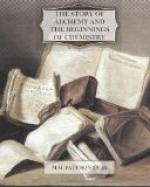Only fragments of the writings of the founders of the atomic theory have come to us. The views of these philosophers are preserved, and doubtless amplified and modified, in a Latin poem, Concerning the Nature of Things, written by Lucretius, who was born a century before the beginning of our era. Let us consider the picture given in that poem of the material universe, and the method whereby the picture was produced.[2]
[2] The quotations from Lucretius
are taken from Munro’s
translation (4th Edition, 1886).
All knowledge, said Lucretius, is based on “the aspect and the law of nature.” True knowledge can be obtained only by the use of the senses; there is no other method. “From the senses first has proceeded the knowledge of the true, and the senses cannot be refuted. Shall reason, founded on false sense, be able to contradict [the senses], wholly founded as it is on the senses? And if they are not true, then all reason as well is rendered false.” The first principle in nature is asserted by Lucretius to be that “Nothing is ever gotten out of nothing.” “A thing never returns to nothing, but all things after disruption go back to the first bodies of matter.” If there were not imperishable seeds of things, atoms, “first-beginnings of solid singleness,” then, Lucretius urges, “infinite time gone by and lapse of days must have eaten up all things that are of mortal body.”
The first-beginnings, or atoms, of things were thought of by Lucretius as always moving; “there is no lowest point in the sum of the universe” where they can rest; they meet, clash, rebound, or sometimes join together into groups of atoms which move about as wholes. Change, growth, decay, formation, disruption—these are the marks of all things. “The war of first-beginnings waged from eternity is carried on with dubious issue: now here, now there, the life-bringing elements of things get the mastery, and are o’ermastered in turn; with the funeral wail blends the cry which babies raise when they enter the borders of light; and no night ever followed day, nor morning night, that heard not, mingling with the sickly infant’s cries, the attendants’ wailings on death and black funeral.”
Lucretius pictured the atoms of things as like the things perceived by the senses; he said that atoms of different kinds have different shapes, but the number of shapes is finite, because there is a limit to the number of different things we see, smell, taste, and handle; he implies, although I do not think he definitely asserts, that all atoms of one kind are identical in every respect.




